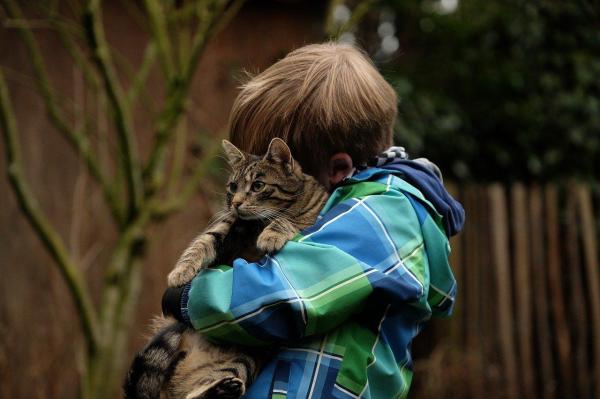What to Know Before Adopting a Cat?


If you are thinking of adopting a cat, you should know that kittens are sociable and affectionate pets that need their own space and a certain amount of independence, but they can also make excellent companions. Adopting a cat is a big responsibility and a long-term commitment, as some cats can live up to 20 years. Make sure you have carefully considered all factors and are ready to bring a cat home.
In this oneHOWTO article, we will explain everything you need to know before adopting a cat and give you some tips on how to choose the cat that best suits your preferences and lifestyle.
Breed and age
It is a good idea to do some research before adopting a cat to find out the characteristics of the breed or mix of breeds. You will be able to learn about their health and any potential health issues associated with the breed, as well as understand their character. All cats are different, and some of these features are breed-specific.
In general, cats with long hair and round heads and bodies are more easygoing than slender cats with narrow heads and short hair, which tend to be more active. Adoption counselors can advise you on how to match the cat's personality with your own.
It is also important to decide whether you want to adopt a kitten or an adult cat, and weigh the possible pros and cons in each case. It is more likely that the kitten will adapt more quickly to the habits of the house. However, you will also need to be patient in teaching them basic routines regarding meals or where to relieve themselves. Adult cats also require a certain amount of training, but generally the training is easier than with kittens.
Health
To be fully informed about the health of your cat, pick a veterinarian in advance and schedule an appointment as soon as possible after adoption.
A veterinary examination is essential to ensure that the animal is not suffering from any illness. During your first visit, you should take with you any medical records you received from the adoption agency. You must also make sure that the animal has been dewormed and that the appropriate vaccinations have been administered.
Just like humans, cats need to be vaccinated throughout their lives to prevent disease and ensure they have an excellent quality of life.

Sex
Before bringing a new cat into your home, you should consider whether to adopt a male or female cat, since one sex might be a better fit for your family than the other. Before we get into the differences between male and female cats, you should know that many personality traits and behaviors are more pronounced in unneutered animals. Spaying and neutering play a massive role in determining the personalities and behaviors of cats. These are some of the most common behaviors in both unneutered male and female cats:
- Male cats are more prone to spraying urine in and around your home.
- Male cats are also more prone to aggression and escape attempts in search of female cats.
- Female cats tend to sing loudly to attract male cats.
If your cat has been neutered, which we at AnimalWised strongly recommend, they are less prone to these problematic behaviors. There are other behaviors that occur in both neutered and unneutered cats, such as:
- Male cats tend to be more social and affectionate towards people and other cats.
- Male cats usually form close bonds with other cats in the house, even if they are not from the same litter.
- Females are often more reserved and less cuddly.
- Male cats are usually more playful than females.
Just like humans, cats are individuals with their own personalities, likes and dislikes, and the behaviors described above are merely generalizations.
If you have decided not to neuter your cat, you should know that your pet's changed behavior during heat may surprise you. It is important to know and understand this process and the behaviors associated with it before your cat reaches sexual maturity.
What you will need to get started
Cats are territorial, and when they come to a new home, they may feel very uncomfortable in the space they are unfamiliar with. You can help your cat by providing a small area for them to call their own for the first few days or weeks. A bathroom or laundry room works well.
Set up a feeding station with food and water bowls. Do not place it near the litter box.
Fill a litter box with one or two inches of litter and place it in a room where the cat can use it undisturbed.
A cat's claws need to be worn down, and they do that by scratching on things. Provide your cat with an acceptable scratching area, so that they will not be tempted to use your chairs or sofa.
Cats love to hole up in small places. Provide your new cat with its own small, safe space. If your cat came home in a cat carrier, this might be a good initial choice. You can also cut a door in the end of a box large enough for your cat to walk in.
Winning the love and trust of a cat is no easy task. It is a process that requires time, patience, and lots of love.

Are you ready to have a cat?
Adopting any pet is a responsibility and there is a cost associated with it. Therefore, you should plan for the short- and long-term costs of getting a cat. Even if adopting a cat from a shelter is a bargain, since many facilities have already provided for neutering, initial vaccinations and a microchip for permanent identification, there may be other expenses down the road. Especially as the cat gets older and visits to the vet become more frequent.
You should also make sure everyone in the house is prepared for the cat before it comes home. For example, consider if a family member is allergic to the fur of certain animals or if pets are allowed in your neighborhood, Everyone in the family should be on board with such an important decision. Visiting the shelter or animal control facility should be a family affair.
If you are adopting a new cat and already have pets at home, you should discuss with the adoption center how to properly introduce the animal. If this is the case, you might also consider getting help from an ethologist or educator.
Note that cats, unlike dogs, are not pack animals. They are very independent, so the introduction of the new family member must be done with great care and attention if you want your cats to get along well.
Adaptation period
Depending on the age and previous experience of the animal, the acclimation period will be more or less long and more or less complex, but this is a variable that you must always take into account.
To make this period easier on you and the cat, it is important that you spend time with the cat so that you create a strong bond from the beginning. Remember that play and positive encouragement (small rewards when the cat does something right) are the best way to quickly integrate the cat into the family.
However, let them come to you. Do not force them. Let them get acquainted with you at their leisure. If they do not approach, leave them alone and try again later. Some cats are particularly fearful and may retreat to their hiding place and not come out when you are around. Give them time to adjust.
Also keep in mind that your newly adopted cat may not eat much or at all at first. It's best to give your cat the same food they were given at the shelter or in their foster home, at least initially. If some things are familiar to them, they will feel more confident. Change the water frequently and make sure they are drinking. If your cat has not eaten for a few days, call your veterinarian for advice.
As we mentioned earlier, cats tend to hide in places where they are hard to find. This happens when they need a moment of rest without anyone disturbing them.

Precautions at home
Cats are mischievous, agile, and curious. Therefore, before adopting a cat, it is important to take some steps and introduce new rules or habits at home. For example, do not leave food within the cat's reach for the first few weeks. Be sure to close all doors and windows when you are away for long periods of time, as it is not uncommon for cats to try to escape and explore the outside. Take extra precautions if you have a balcony or live on a high floor.
Look at your home through the eyes of a curious cat to see the opportunities for climbing and exploring. Once your cat is comfortable in their new home, they will likely explore left alone. Make sure there is nothing on display that could be damaged if knocked over, such as heaters, electronic devices, etc.
If you want to read similar articles to What to Know Before Adopting a Cat?, we recommend you visit our Pets category.







